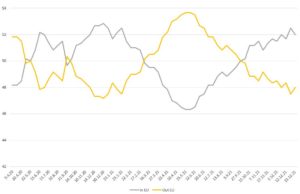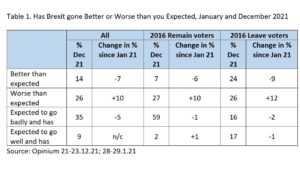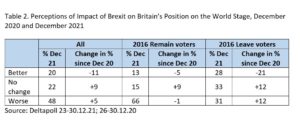Brexit has created a trio of notable anniversary dates – June 23rd when the referendum was held, the end of December, when (just over a year ago) the UK left the EU single market and customs union, and today, which is the second anniversary of the UK’s exit from the political institutions. So, it is a timely moment to examine where public attitudes towards Brexit now stand, aided by those polls that have addressed the issue in the last couple of months.
The subject has, of course, largely gone off the political agenda, with perhaps the exception of last autumn when there was debate about how far the shortage of lorry drivers, petrol, and food on the supermarket shelves was occasioned by Brexit. Though the government regularly argues that Brexit has been beneficial, and have now proposed making it easier to repeal EU law, the opposition parties (with the exception of the SNP) have largely preferred not to take up the subject.
Given this political quietude it is sometimes suggested that Brexit is no longer a divisive issue among the public and that, in particular, many of those who backed Remain have now accommodated themselves to the outcome. Yet this is far from the truth. Voters continue to be evenly divided on whether they wish to be inside or outside the EU, while support for being outside has actually eased somewhat during the last twelve months – thanks to a movement among both those who voted Remain and those who backed Leave in 2016.
This story is apparent from our post-Brexit poll of polls. As we noted when we first introduced it at the beginning of November, support for being ‘In’ or ‘Out’ of the EU has fluctuated since the UK left two years ago. After the polls largely found a majority opposed to Brexit during most of 2020, the balance of opinion swung in favour of being outside the EU following the exit from the single market – only then to move back again during the second half of last year. At the moment, our poll of polls is registering ‘In EU’ 52%, ‘Out EU’ 48%.
Figure. Post-Brexit Poll of Polls since February 2020
Much the same trend over the last year is discernible from YouGov’s question that asks people whether, ‘in hindsight’, the UK was right or wrong to leave the EU. Between February and June last year, on average those who said that the decision was wrong (45%) only marginally outnumbered those who said it was right (43%). But in the three months between July and September, the gap had widened to five points (46% wrong, 41% right), while since October it has stood at ten points (49% wrong, 39% right). That is as large a consistent lead for ‘wrong’ that YouGov has registered since the company started asking the question in August 2016.
Some of the swing away from Brexit has occurred among 2016 Remain voters. Last March and April, the polls were on average finding that only 69% of them would vote to rejoin the EU – giving some apparent credence to the claim that Remain voters were beginning to accept Brexit. However, in polls since mid-November that figure has increased to 76%. Meanwhile, although as many as 82% of 2016 Remain voters were saying last spring that Brexit was wrong, in the last two months that figure has risen to as much as 88%. Remain voters are in fact now rather less likely to accept Brexit than they were a year ago.
Some of those who backed Leave in 2016 have, though, also changed their minds. In March and April last year, as many as 87% said they would vote to stay out of the EU, well above the proportion of Remain voters who would still vote the same way. But now the figure has dropped to 80%, only slightly above the level of loyalty being expressed by Remain voters. And because those who did not vote in 2016 continue to prefer being in the EU over outside the EU by around two to one (among those expressing a view) this narrowing of the loyalty gap between Remain and Leave supporters is enough to result in polls that overall put ‘In the EU’ narrowly ahead. Meanwhile, only 79% of 2016 Leave voters now say that the Brexit decision is right, compared with 85% last spring.
Some of the more detailed polling that has been done in the last couple of months helps explain the trend among Remain and Leave voters. For it indicates that pessimism among Remain voters about the consequences of Brexit has grown, while some of the optimism among Leave voters has dissipated. This point is illustrated here by a couple of examples where a recent poll has replicated a question that was also asked at the beginning of last year.
The first, in Table 1, shows how people have responded when asked by Opinium whether they thought Brexit has gone better or worse than they expected. The proportion who say that it has gone worse than they expected has risen by between ten and twelve points among both Remain and Leave voters – while both groups have also registered a fall in the proportion who say that it has been better than they expected.
Meanwhile, Table 2 shows how voters have responded when asked about the impact of Brexit on Britain’s position on the world stage. Leave voters are now much less likely to say that Britain’s position on the world stage has got better in the wake of Brexit, and although relatively few Remain voters were of that opinion in the first place, among them too there has also been something of a fall.
Confidence in the government’s handling of Brexit has declined in parallel with the trend in perception of its consequences. According to YouGov, the proportion who think that the government is handling Brexit badly has increased since the beginning of last year by eighteen points (to 81%) among Remain voters and by nine points (to 34%) among Leave supporters. Meanwhile, according to Deltapoll, there has been a thirteen point drop (to 59%) in the proportion of Leave voters who trust Boris Johnson to ‘get Brexit done’ and by eleven points (to 38%) among Remain voters.
It looks then that the experience of living for a year with the consequences of Brexit in full has resulted in a small but significant swing away from support from the decision that was made over five years ago. Perhaps the implementation of Brexit is simply sharing the fate of many a public policy, that is, that it proves less popular when put into practice. But it does mean that it is unwise to assume that the debate is over. Indeed, according to Savanta ComRes, nearly a half of voters (48%) think that there should be another referendum within ten years, while only 39% believe it should be delayed longer than that (if held at all). Far from being forgotten, Brexit is an issue that still has the potential to divide.
By John Curtice
John Curtice is Senior Research Fellow at NatCen and at 'UK in a Changing Europe', Professor of Politics at Strathclyde University, and Chief Commentator on the What UK Thinks: EU website.





Of course we should have stayed in the EU. I live in Northern Ireland where we voted narrowly to remain. I live less than 20 miles from the border and have an Irish passport. I dont necessarily want a united Ireland but wish we were all in Europe. I asked a friend how she would vote in the referendum and she said she would vote leave so that she could get the old style light bulbs which Brussells had banned! Some hope.Report
One man. One single disingenuous man for reasons of his oversized ego and wish to become “king”, caused this mess by pushing through Brexit. (It’s true that one can also blame Cameron for his part.) Bojo was never a Brexit supporter. But he saw an opportunity for himself – not for the country, but FOR HIMSELF – to milk the ill-fated deal, to lie to the people and to promote the slogan, “GET BREXIT DONE”, much in the same way Trump pushed his slogan, “MAKE AMERICA GREAT AGAIN”.
What you see in the U.K. today is the result of the above. Blame also the people who voted for Brexit for nostalgic reasons and/or without even knowing what the benefits of belonging to the EU were.Report
Hogwash and Pro EU propaganda by Pro EU body. People think the government is handling Brexit badly as do I an ardent Brexit supporter because they are dragging their feet and have not gone far enough, quickly enough. Everyone I talk to has said the same they would still vote to leave. In fact, several remainers have said having seen how the EU treats the UK they would now vote to Leave. Report
These statistics should be considered by both the Labour and Liberals when putting together their manifestos for the next election Report
The blind refusal of brexiteers to acknowledge their unravelling mess is typified by the DUP, who, despite ignoring the NI vote to remain, and the fact that 70% of businesses there are doing better under the protocol, want section 16 implemented. Frost had no answer to that problem, Johnson lied about his fudged deal and there remains no solution if a hard Eire/NI border is to be avoided. Rees Mogg asking Sun readers for help is laughable, brexit benefits are illusory.Report
what woud be interesting to know is what those too young to vote in 2016, but now able (several million) feel about Brexit. This becomes doubly important given that large numbers of more elderly voters who voted for Brexit in the largest numbers will have diedReport
Are we still going to have to pay the ‘Divorce Bill’ which was negotiated. for Brexit?
Two main points should have been spelt out to the public before the referendum
1) Our cost of being in the E.U. was never as much as was claimed by the ‘Leavers’ as almost 60%
was given back to us in grants.to farmers and deprived areas.
2) I never heard any one mention the trouble with Northern Island with its border to an EU country which was bound to happen.
Of course if we were ever wanting to rejoin the E.U. they will take us to the cleaners!Report
Is there any polling on whether Britain should try to rejoin the single market and customs union (the “Norway Option”)?
I guess that it might attract majority support, but does it?Report
I wish we knew how many of the ‘Did not vote in the Referendum’ group were those who were too young in 2016. After five and a half years, there must be some 4 million of them now, and it would be useful for their opinions to be separated from older voters who failed to vote for other reasons. I suspect this young group tend heavily towards Remain or Rejoin, but I do not know. Does any polling separate them out?Report